 Every 67 seconds someone in the United States is diagnosed with Alzheimer’s disease and new estimates suggest that it may be the third leading cause of death of older people. Alzheimer’s disease is associated with losses in memory in older people that become severe enough over time to interfere with normal daily functions.
Every 67 seconds someone in the United States is diagnosed with Alzheimer’s disease and new estimates suggest that it may be the third leading cause of death of older people. Alzheimer’s disease is associated with losses in memory in older people that become severe enough over time to interfere with normal daily functions.
 For most of the common cancers, a major cause has been identified: smoking causes 90% of lung cancer worldwide, hepatitis viruses cause most liver cancer, H pylori bacteria causes stomach cancer, Human papillomavirus causes almost all cases of cervical cancer, colon cancer is largely explained by physical activity, diet and family history.
For most of the common cancers, a major cause has been identified: smoking causes 90% of lung cancer worldwide, hepatitis viruses cause most liver cancer, H pylori bacteria causes stomach cancer, Human papillomavirus causes almost all cases of cervical cancer, colon cancer is largely explained by physical activity, diet and family history.
 Which is more important to you, your world-view or your health? It may be that the world-view you have absorbed from the society around you is interfering with your control over your own health.
Which is more important to you, your world-view or your health? It may be that the world-view you have absorbed from the society around you is interfering with your control over your own health.
 The Centers for Disease Control and Prevention (CDC) has called insufficient sleep an epidemic. While we are finally paying attention to the importance of sleep, the need for dark is still mostly ignored. That’s right. Dark. Your body needs it too.
The Centers for Disease Control and Prevention (CDC) has called insufficient sleep an epidemic. While we are finally paying attention to the importance of sleep, the need for dark is still mostly ignored. That’s right. Dark. Your body needs it too.
 Exposure to air pollutants during pregnancy may contribute to childhood abnormalities in the brain, a new study suggests. The research, from the Children’s Hospital of Los Angeles, measured the exposure of the mothers to PAH air pollution and used brain imaging to look at the effects on their children’s brains.
Exposure to air pollutants during pregnancy may contribute to childhood abnormalities in the brain, a new study suggests. The research, from the Children’s Hospital of Los Angeles, measured the exposure of the mothers to PAH air pollution and used brain imaging to look at the effects on their children’s brains.
 Scientists knew that oleocanthal killed some cancer cells, but weren’t really sure how. They thought the compound might be targeting a key protein in cancer cells that triggers a programmed cell death, known as apoptosis, and decided to test their hypothesis.
Scientists knew that oleocanthal killed some cancer cells, but weren’t really sure how. They thought the compound might be targeting a key protein in cancer cells that triggers a programmed cell death, known as apoptosis, and decided to test their hypothesis.
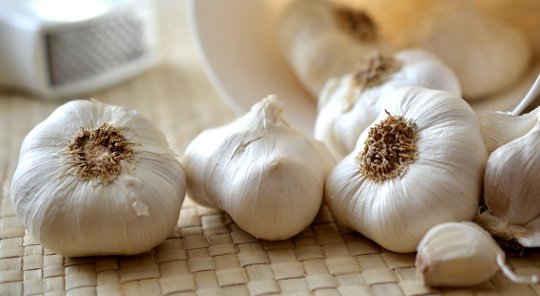 A nutrient in garlic may offer the brain cells protection against aging and disease, according to new research. “Most people think of it as a ‘superfood,’ because garlic’s sulfur-containing compounds are known as an excellent source of antioxidant and anti-inflammatory protection."
A nutrient in garlic may offer the brain cells protection against aging and disease, according to new research. “Most people think of it as a ‘superfood,’ because garlic’s sulfur-containing compounds are known as an excellent source of antioxidant and anti-inflammatory protection."
 If you use your area’s air pollution as a reason not to exercise, you might need to find a better excuse. Even in heavily polluted areas, the benefits of exercise outweigh the harmful effects of air pollution in relation to the risk of premature mortality, a new study reports.
If you use your area’s air pollution as a reason not to exercise, you might need to find a better excuse. Even in heavily polluted areas, the benefits of exercise outweigh the harmful effects of air pollution in relation to the risk of premature mortality, a new study reports.
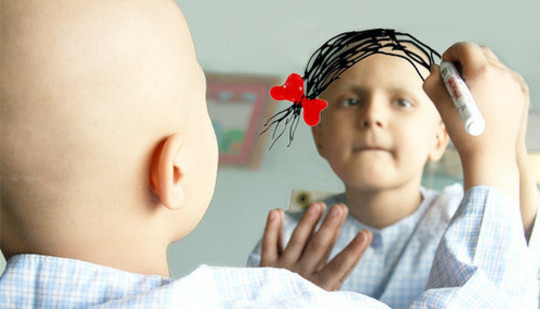 The way we talk about illness matters. This is perhaps no more evident than in the many passionate critiques of the metaphor of the “fight” against cancer, which many of us will eventually “lose”. In the 1970s, Susan Sontag famously exposed the negative implications for patients of this “military rhetoric about cancer”.
The way we talk about illness matters. This is perhaps no more evident than in the many passionate critiques of the metaphor of the “fight” against cancer, which many of us will eventually “lose”. In the 1970s, Susan Sontag famously exposed the negative implications for patients of this “military rhetoric about cancer”.
 Fasting is something that human beings have practiced throughout history, often out of circumstance rather than choice. Intermittent fasting (also called alternate day fasting) has become a popular diet. In most versions of intermittent fasting, people fast or eat very little a few days each week and then eat normal amounts during the remaining days.
Fasting is something that human beings have practiced throughout history, often out of circumstance rather than choice. Intermittent fasting (also called alternate day fasting) has become a popular diet. In most versions of intermittent fasting, people fast or eat very little a few days each week and then eat normal amounts during the remaining days.
TFP Public discussions about obesity can fall prey to false dichotomies in portraying complex relations among weight, eating, activity and disease risk. Applying the logic of false dichotomies, obesity is either caused by individuals eating too much, or an environment that promotes weight-gain. It’s either a disease or the result of gluttony.
Public discussions about obesity can fall prey to false dichotomies in portraying complex relations among weight, eating, activity and disease risk. Applying the logic of false dichotomies, obesity is either caused by individuals eating too much, or an environment that promotes weight-gain. It’s either a disease or the result of gluttony.
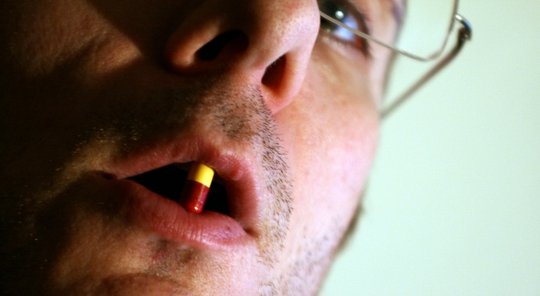 Australians are 40 times more likely to die from errors in health care than from traffic. Poor communication resulting from uncivil medical hierarchies can be deadly. Mistakes caused by poor communication are particularly frequent in surgical teams. Similarly, doctors are both the least compliant with...
Australians are 40 times more likely to die from errors in health care than from traffic. Poor communication resulting from uncivil medical hierarchies can be deadly. Mistakes caused by poor communication are particularly frequent in surgical teams. Similarly, doctors are both the least compliant with...
 We all suffer from too little sleep from time to time, some more than others. There are many possible reasons, depending on our age, genes and sleep habits; but another possible culprit is using technology before going to sleep.
We all suffer from too little sleep from time to time, some more than others. There are many possible reasons, depending on our age, genes and sleep habits; but another possible culprit is using technology before going to sleep.
 In my practice as a speech language pathologist and music therapist, I’m able to use music to serve a variety of patients with an array of needs. Children with autism tend to be more attentive to musical sounds than speech sounds. For cancer patients, I’ll use songs of hope and resilience. I’ve helped patients preparing for surgery...
In my practice as a speech language pathologist and music therapist, I’m able to use music to serve a variety of patients with an array of needs. Children with autism tend to be more attentive to musical sounds than speech sounds. For cancer patients, I’ll use songs of hope and resilience. I’ve helped patients preparing for surgery...
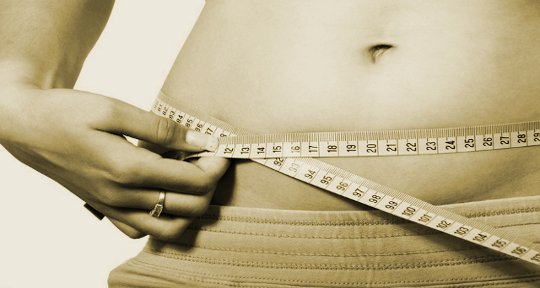 “Our goal is to prevent or reduce obesity and in this paper we’ve shown how to do this in principle,” says Phipps. “We believe that weight gain is not necessarily just a result of eating more and exercising less. Our focus is on the intricate network involved in fat cell development.”
“Our goal is to prevent or reduce obesity and in this paper we’ve shown how to do this in principle,” says Phipps. “We believe that weight gain is not necessarily just a result of eating more and exercising less. Our focus is on the intricate network involved in fat cell development.”
 Our body loves us, but it needs to know we love our lives in order for it to do all it can to help us survive. The change in body energy activated by the love alters our internal chemistry and makes a difference. When you are willing to do the work, and live in your heart, magic can happen.
Our body loves us, but it needs to know we love our lives in order for it to do all it can to help us survive. The change in body energy activated by the love alters our internal chemistry and makes a difference. When you are willing to do the work, and live in your heart, magic can happen.
 In 1954, the first director-general of the World Health Organisation, Dr Brock Chisholm, famously stated: “Without mental health there can be no true physical health.” More than half a century later, we have large numbers of studies backing up his belief.
In 1954, the first director-general of the World Health Organisation, Dr Brock Chisholm, famously stated: “Without mental health there can be no true physical health.” More than half a century later, we have large numbers of studies backing up his belief.
Common over-the-counter painkillers, such as ibuprofen and aspirin, can decrease risk of developing squamous cell carcinoma, according to a study published in the Journal of Investigative Dermatology. Squamous cell carcinoma is one of the most common types of skin cancer. The results mean these drugs may have potential as skin cancer preventative agents, especially for high-risk people.
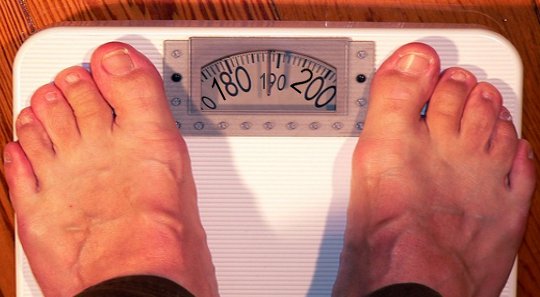 The link between exercise, diet and ill health has been recognised for a considerable length of time. The ancient Greek physician, Hippocrates (460-370BC), wrote: Eating alone will not keep a man well; he must also take exercise. For food and exercise … work together to produce health.
The link between exercise, diet and ill health has been recognised for a considerable length of time. The ancient Greek physician, Hippocrates (460-370BC), wrote: Eating alone will not keep a man well; he must also take exercise. For food and exercise … work together to produce health.
 The trendy Paleo Diet draws inspiration from how people lived during the Paleolithic or Stone Age that ran from roughly 2.6 million to 10,000 years ago. It encourages practitioners to give up the fruits of modern culinary progress – such as dairy, agricultural products and processed foods – and start living a pseudo-hunter-gatherer lifestyle, something like Lon Chaney Jr. in the film One Million BC.
The trendy Paleo Diet draws inspiration from how people lived during the Paleolithic or Stone Age that ran from roughly 2.6 million to 10,000 years ago. It encourages practitioners to give up the fruits of modern culinary progress – such as dairy, agricultural products and processed foods – and start living a pseudo-hunter-gatherer lifestyle, something like Lon Chaney Jr. in the film One Million BC.
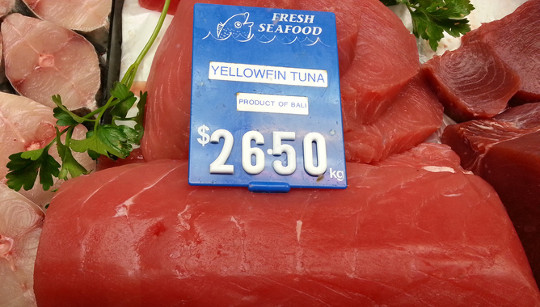 Whether man-made sources of mercury are contributing to the mercury levels in open-ocean fish has been the subject of hot debate for many years. My colleagues Carl Lamborg, Marty Horgan and I analyzed data from over the past 50 years and found that mercury levels in Pacific yellowfin tuna, often marketed as ahi tuna, is increasing at 3.8% per year. The results were reported earlier this month in the journal Environmental Toxicology and Chemistry.
Whether man-made sources of mercury are contributing to the mercury levels in open-ocean fish has been the subject of hot debate for many years. My colleagues Carl Lamborg, Marty Horgan and I analyzed data from over the past 50 years and found that mercury levels in Pacific yellowfin tuna, often marketed as ahi tuna, is increasing at 3.8% per year. The results were reported earlier this month in the journal Environmental Toxicology and Chemistry.
 The prevailing notion about obesity is that if we just work out harder and eat a little bit better, then perhaps the obesity trend will subside in a few years. However, the key to really making a difference is food – the number of calories we eat is the most important factor in obesity.
The prevailing notion about obesity is that if we just work out harder and eat a little bit better, then perhaps the obesity trend will subside in a few years. However, the key to really making a difference is food – the number of calories we eat is the most important factor in obesity.
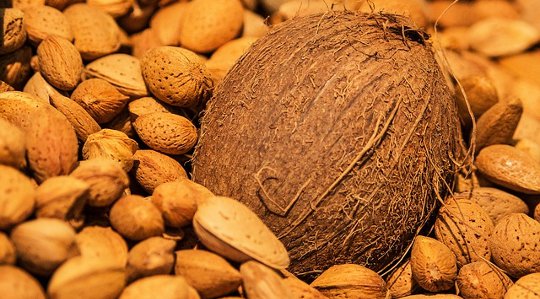 Government nutrition guidelines recommend a high carbohydrate diet regardless of the ample evidence of the health risks it promotes. Yet, chronic diseases and obesity rates have risen in correlation with a reduced intake of dietary fat. While science has moved on, nutritional advice lags behind.
Government nutrition guidelines recommend a high carbohydrate diet regardless of the ample evidence of the health risks it promotes. Yet, chronic diseases and obesity rates have risen in correlation with a reduced intake of dietary fat. While science has moved on, nutritional advice lags behind.
















